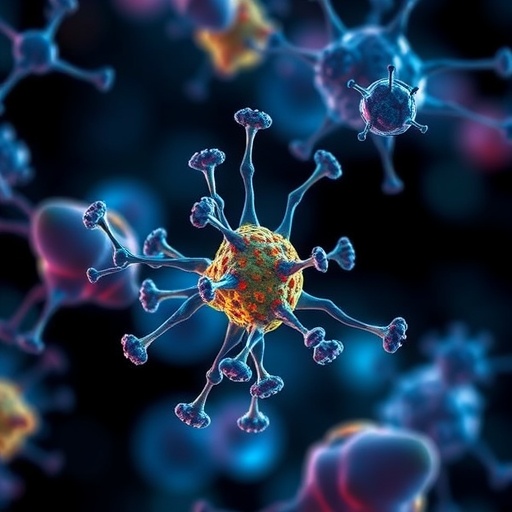A groundbreaking study spearheaded by researchers at Swansea University has unveiled a promising therapeutic strategy to combat autoimmune diseases by targeting a mitochondrial protein critical for immune cell metabolism. This innovative research focuses on the protein ABHD11, a key regulator of energy production within immune cells known as T-cells, which are instrumental in maintaining immune defense but paradoxically contribute to autoimmune pathology when dysregulated.
Autoimmune diseases such as rheumatoid arthritis and type 1 diabetes are characterized by an aberrant immune response where T-cells mistakenly identify the body’s own tissues as foreign invaders, leading to chronic inflammation and tissue damage. Traditionally, treatments have focused on broad immunosuppression, often accompanied by significant side effects and variable efficacy. This new research breaks away from conventional immunity-centric approaches by exploring the metabolic underpinnings that govern T-cell activity.
T-cells activate and proliferate in response to infections or injury by altering their metabolism—the internal biochemical processes that convert dietary nutrients into energy and biosynthetic precursors. This metabolic reprogramming enables them to mount effective immune responses. However, in autoimmune conditions, metabolic processes in these cells become dysregulated, causing sustained pathological activation. The work from the Swansea-led team has identified ABHD11, a mitochondrial protein, as a pivotal modulator of these metabolic shifts.
Mitochondria, often termed the powerhouses of the cell, orchestrate energy production and are central to cellular metabolism. ABHD11, residing within mitochondria, influences metabolic pathways that dictate T-cell function. By employing sophisticated biochemical and cellular techniques, the researchers elucidated how inhibiting ABHD11 dampens the overactive metabolic state of autoreactive T-cells. This metabolic intervention effectively lowers inflammatory signaling, reducing the harmful immune response characteristic of autoimmune diseases.
The implications of these findings are profound. The team demonstrated, through analysis of immune cells derived from both healthy individuals and those suffering from type 1 diabetes and rheumatoid arthritis, that pharmacological blockade of ABHD11 leads to a marked decrease in T-cell overactivity. This not only curbs inflammation but also preserves the beneficial immune functions, presenting a refined therapeutic avenue with potentially fewer side effects.
Beyond cellular assays, the study revealed that targeting ABHD11 delays the onset and progression of type 1 diabetes in preclinical models. This evidence lays a formidable groundwork for the development of ABHD11 inhibitors as disease-modifying treatments, signaling a potential paradigm shift in managing autoimmune disorders by fine-tuning immune cell metabolism rather than broadly suppressing immune function.
The research was a collaborative effort involving experts from Swansea University, the University of Bristol, and Cardiff University. Dr. Nick Jones of Swansea University’s Medical School highlights that this approach exemplifies the burgeoning field of immunometabolism, which seeks to understand and manipulate metabolic processes within immune cells to combat disease. “Adjusting how immune cells utilize dietary fuels through targeting mitochondrial proteins like ABHD11 could revolutionize treatment strategies for autoimmune conditions,” Dr. Jones explained.
Traditional immunosuppressants frequently present challenges including susceptibility to infections and incomplete disease remission. By contrast, targeting metabolic regulators such as ABHD11 offers a more nuanced approach that modulates immune responses specifically at the metabolic level, potentially minimizing adverse effects and improving patient outcomes.
The research team is now focusing on broader applications of their findings, investigating how ABHD11 inhibition affects other immune cell subsets implicated in various autoimmune diseases. This exploration aims to expand the therapeutic potential beyond T-cells, addressing complex immune networks that contribute to autoimmunity.
Yasmin Jenkins, a joint first author and PhD candidate at Swansea University, emphasizes the exciting therapeutic possibilities arising from metabolic intervention. She notes, “Our work underscores the critical role of mitochondrial metabolism in T-cell function and presents ABHD11 as an attractive target for novel autoimmune therapies. Continued research may reveal wider applicability across different autoimmune disorders, paving the way for next-generation immunometabolic drugs.”
This study challenges the existing paradigms in autoimmune disease treatment and highlights the intricate link between metabolism and immune regulation. By shedding light on mitochondrial ABHD11’s role in T-cell effector function, it opens a frontier in precision medicine, steering toward treatments that are both effective and bear reduced therapeutic risk.
The findings have been peer-reviewed and published in the prestigious journal Nature Communications, reflecting the scientific rigor and immense potential of the research. Such advances underscore the importance of multidisciplinary collaborations integrating immunology, metabolism, and pharmacology to combat debilitating chronic diseases that affect millions worldwide.
As the scientific community further unravels the complexities of immune cell metabolism, targeting mitochondrial proteins like ABHD11 emerges as a compelling strategy. This innovative approach heralds a new era in the design of therapies that are not only disease-modifying but also tailored to the metabolic landscape of immune cells, fostering lasting remission and improved quality of life for patients with autoimmune disease.
Subject of Research: Immunometabolism; Autoimmune disease treatment through targeting mitochondrial protein ABHD11 in T-cells
Article Title: Mitochondrial ABHD11 inhibition drives sterol metabolism to modulate T-cell effector function
News Publication Date: 3-Nov-2025
Web References:
https://www.nature.com/articles/s41467-025-65417-4
http://dx.doi.org/10.1038/s41467-025-65417-4
Keywords: Health and medicine, autoimmune disease, T-cell metabolism, mitochondrial function, ABHD11, immunometabolism, inflammation, type 1 diabetes, rheumatoid arthritis, therapeutic target, immune regulation




